History
Prior campaigns
Related campaigns
THE TOBACCO INDUSTRY: A HISTORY OF MANIPULATION
Here are a few of the strategies employed by the tobacco industry and some victories in the name of health over the years.
HISTORY OF DE FACTO CAMPAIGNS
De Facto media campaigns have been financed by the Quebec Ministry of Health and Social Services since 2007.
2023
Advancement
FLAVOR BAN
Since October 31, 2023, new regulations prohibit the sale of vaping products with flavors or aromas other than tobacco.
Ministère de la Santé et des Services Sociaux2022
Advancement
NEW WORDING ON CIGARETTES
The Canadian government requires warnings about the dangers of smoking to be printed directly on each individual cigarette.
Gouvernement du Canada2021
Setback
THE NEW FACES OF NICOTINE
Nicotine consumption is changing: the rate of smoking is slowly decreasing, while vaping is skyrocketing. Even worse, these new products attract proportionally more young people than adults.
Info-Tabac2020
Advancement
NEW STRATEGY FOR A TOBACCO-FREE QUEBEC 2020-2025
This document guides the actions of the Minister for Health and Social Services and its partners in tobacco control and vaping.
MSSS2019
Advancement
NEW FEDERAL REGULATIONS IMPOSED
The plain cigarette package now mandatory in Canada.
Radio-Canada2018
2017
Setback
TAX HIKE ON TOBACCO
With the government having taken measures by raising taxes on tobacco products, it has been observed that the tobacco industry has simply increased the price of its products so as to not suffer any losses in profit. This of course means that the consumer is who pays to keep the tobacco industry getting richer.
Coalition Québécoise pour le Contrôle du Tabac2016
Advancement
NEW PROHIBITION ON CIGARETTE PACKAGES
Smaller packs of cigarettes that resemble lipstick are prohibited.
Coalition Québécoise pour le Contrôle du TabacAdvancement
NEW LEGISLATION PROHIBITING SMOKING AT ALL ENTRANCES TO PUBLIC BUILDINGS
Protection from second hand smoke continues to increase in front of public buildings. Since 2006, the smoke-free zone extends to nine (9) metres from the front doors of school buildings or education establishments as well as health services buildings. These zone regulations now also apply to public buildings and private residential ones.
Ministère de la Santé et des Services SociauxSetback
THE TOBACCO INDUSTRY FIGHTS BACK
On the heels of the public inquiry on the neutral packaging by the Canadian government, the tobacco industry launches a misinformation campaign targeting the less educated but neglects to mention the impact of their branding on young people.
Info-TabacAdvancement
ONE STEP TOWARDS NEUTRAL PACKAGING IN CANADA
The federal government launches a public inquiry into steps towards the standardization of packaging of tobacco products. By moving in this direction, Canada would join Australia, France, the UK, Ireland and Hungary who have all adopted neutral packaging. The ban of all tobacco advertising and promotional partnerships has allowed for an average reduction in tobacco consumption of 7%.
Canadiens en santéAdvancement
A NON-SMOKING ENVIRONMENT FOR OUR CHILDREN
With the passing of Bill 44, it is now illegal to smoke in cars in the presence of children, in school yards and around daycares and on terraces.
MSSS2015
Advancement
THE END OF MENTHOL IN QUEBEC
Renowned for its properties as anesthesia that masks the flavour and increases the dependence on tobacco, menthol, just like other flavouring agents, softens a dangerous product. Canada is expected to follow Quebec by May 2017.
La GazetteAdvancement
HISTORIC RULING OF 15 BILLION AGAINST TOBACCO MANUFACTURERS
After a 17-year wait, upwards of 100,000 Quebec victims of the practices of the cigarette industry win two rulings against three of the largest tobacco companies.
La PresseAdvancement
A NEW LAW FOR QUEBEC
After a 10-year wait, Bill 44, a project focused on toughening the battle with tobacco companies is adopted. This marked a major victory for Quebecers. This law notably bans menthol and all other flavours used in tobacco products and regulates the use of electronic cigarettes.
MSSSAdvancement
DE FACTO BACK BEFORE THE PARLIAMENTARY COMMISSION
De Facto remind to the parliamentary the importance of preventing manufacturers to use flavors and packaging to attract young people.
2014
Setback
ELECTRONIC CIGARETTES, A NEW MARKET FOR TOBACCO COMPANIES
The electronic cigarette is growing in popularity. So much so that all the big tobacco companies are now in the market!
Info-Tabac2013
Advancement
WORLD HEALTH ORGANIZATION WARNS TO REFRAIN USING E-CIGARETTES
With the absence of in-depth studies into the effects of electronic cigarettes, the World Health Organization recommends refraining from using such products.
INSPQAdvancement
DE FACTO GOES BEFORE THE PARLIAMENTARY COMMISSION
De Facto asks the parliamentary commission to re-examine the laws on tobacco from 2005-2010 so that the new law can attack this problem at the source. They must stop cigarette manufacturers from using flavours and attractive packaging to draw in young people.
Advancement
ELECTRONIC CIGARETTE (VAPE) ATTRACTS TOBACCO COMPANIES.
The big tobacco companies put their support behind the sales of electronic cigarettes. This new product is not regulated by any type of law.
CBS News2012
Setback
RECORD PROFITS OF 35 BILLION FOR THE TOBACCO INDUSTRY
Revenues from the sale of tobacco are estimated at 500 billion which generates over 35 billion for the six major tobacco companies, equalling $1,100 per second.
The GuardianAdvancement
INFORMATION IN SUPPORT OF SMOKERS
The appearance on the market of new warnings covering 75% of the two main faces of packaging of cigarettes and small cigars and cigarillos, including a phone number and website in support of quitting. (Federal law)
Gouvernement du CanadaAdvancement
THE QUEBEC GOVERNMENT DEMANDS 60 BILLION
The start of the mega-trial against tobacco companies. The Quebec government is requests $60 billion from several tobacco companies to cover the public costs related to cancer and heart problems caused by cigarettes. This marks the biggest lawsuit ever levied by the provincial government.
Info-TabacAdvancement
THE CONTROL OF CONTRABAND TIGHTENS
To impede contraband, tobacco companies must include an excise stamp on all tobacco product packaging.
Revenu-Québec2011
Setback
SIX MILLION DEAD EVERY YEAR
The epidemic of smoking kills upwards of six million people each year. Over five million of those are either smokers or former smokers, which 600,000 others are non-smokers involuntarily exposed to second-hand smoke.
World Health OrganizationAdvancement
THE END OF THE USE OF MISLEADING TERMINOLOGY
Canadian cigarette manufacturers must not ever use terms like “light” and “mild” (and its variants) (federal regulation). These terms do not mean the product is any less dangerous than regular cigarettes.
La GazetteAdvancement
AUSTRALIA: AN EXAMPLE TO FOLLOW
Neutral packaging for all tobacco products went into effect in Australia in December 2011. They were the first country in the world to adopt such a law.
Australian Government2010
Setback
A NEW TRICK TO BYPASS THE LAW
Before the law forbidding the flavouring of tobacco products of 1.4 grams or less, the tobacco industry comes up with a new trick. They slightly increased the weight of cigarillos in order for them not to meet the definition of “small cigar” and instead qualify as full-fledged cigars who do not have such restrictions on flavourings. The tobacco industry thus still finds a way to reintroduce enticing flavours into the market for younger consumers.
Coalition Québécoise pour le Contrôle du TabacAdvancement
TWO MORE TOBACCO COMPANIES ADMIT TO THEIR GUILT
JTI-macdonald (formerly RJR-Macdonald) and R.J. Reynolds admit to having contributed to the cigarette black market in Canada in the early 1990s.
CNCTAdvancement
THE END OF STRAWBERRY, BUBBLE GUM AND COTTON CANDY FLAVOURED TOBACCO
The adding of flavours to tobacco is one of the numerous tactics employed by the tobacco industry which promotes experimentation by young people and maintaining of addiction. As of july 5, 2010, it became illegal to use flavour additives in cigarettes and cigarillos, with the exception of menthol.
Publications QuébecAdvancement
STICKERS THAT HIDE THE TRUTH
In efforts to circumvent the ban on advertising, the tobacco industry combine new ads on cigarette packs. These come in the form of stickers or printing on the cellophane wrapper which highlights the historical attributes and supposed benefits of these deadly products for smokers. These stickers make smokers interact with the pack, adding an amusing element which creates noise that diverts attention from the health warnings.
Coalition Québécoise pour le Contrôle du Tabac2009
Setback
CAMOUFLAGING DEATH WITH STYLE
In order to specifically target women, a new brand of cigarette is born in quebec. The name of the brand (vogue), its appearance (thinner format) and its packaging contribute to associating smoking with femininity and fashion.
Coalition Québécoise pour le Contrôle du TabacAdvancement
SOON TO BE DONE WITH CANDY FLAVOURS!
Bill C-32 stipulates that tobacco companies are forbidden to add flavours to any cigarillos or cigarettes. This law will go into effect in July 2010.
Parlement du CanadaSetback
PACKAGING WELL TO KILL BETTER
The tobacco industry gives their products a younger look. Certain packaging of tobacco products resemble electronic gadgets (ipod, cell phones), candy wrappers, lipsticks or any over device that would appeal to youth.
Coalition Québécoise pour le Contrôle du Tabac2008
Advancement
OUT OF SIGHT, FAR FROM THE HEART
As of now, it is forbidden to display tobacco industry products, or their packaging, in clear view of consumers at the point of sale. In addition, small cigars can only be sold within a sale of a tobacco product at a cost of $5 or more.
Légis QuébecAdvancement
TOBACCO INDUSTRY FOUND GUILTY OF CONTRABAND
The two biggest canadian tobacco manufacturers (imperial tobacco limited and rothmans, benson and hedges inc.) are found guilty of having taken part in the contraband of cigarettes and are ordered to pay $300 million in fines and $850 million in allowances.
Info-Tabac2007
Setback
THE TOBACCO INDUSTRY SEES IT ALL COMING
Misleading terminology like “light” and “mild” will soon be banned on all packaging of tobacco industry products due to a ruling by health canada. The industry reacts to this measure before it even goes into effect by giving new qualitative features to its products like “smooth” and “rich”. These new terms, which are just as misleading, leave a false impression of the dangers of smoking.
Coalition Québécoise pour le Contrôle du Tabac2006
Setback
CIGARETTES WITH VITAMINS?!
Another new brand of cigarettes, vitacig, hit the market and claim to supply vitamins and minerals and even antioxidants. These claims create false impressions as to the dangers of the product given that all the “modifications” made to the tobacco change practically nothing regarding dangers of the over 4,500 toxins still found in the product.
Coalition Québécoise pour le Contrôle du TabacSetback
MISLEADING ADVERTISING: AZUR CIGARETTES
The tobacco industry promotes a new product which claims to be less harmful: azur cigarettes. This brand advertised as being less dangerous for smokers who do not want to or cannot quit smoking since its biofilters protect lungs.
Coalition Québécoise pour le Contrôle du TabacAdvancement
PUBLIC SPACES: SMOKE-FREE ENVIRONMENTS
It is forbidden to smoke in practically all enclosed public spaces, including, bars, restaurants and any area accessible to minors. It also forbidden to smoke or to supply tobacco to minors in buildings and on school grounds at both the elementary and high school levels.
Publications du Québec2005
Setback
SMOKE-FREE TOBACCO GETS A FLAVOUR BOOST!
The addition of alluring flavours to smoke-free tobacco products (I.E. Chewing tobacco) contributes to a rise in the sales of these products. These flavours increase the attractive of these products and encourage consumers to try them, most notably young people.
Médecins pour un Canada sans fumée2004
Advancement
ADVERTISING INDIRECTLY
Despite the law that was passed in 2003 outlawing all sponsorship, the tobacco industry finds other ways to promote its products. For example, during the open house at the canadian grand prix, the cars of team Jordan which is sponsored by Benson & Hedges would be marked with “BE ON EDGE”, evoking a direct reference to that brand of cigarette.
Coalition Québécoise pour le Contrôle du Tabac2003
Setback
NEW VICTIMS OF THE TOBACCO INDUSTRY
The tobacco industry turns to the country in hopes of development. It employs tactics used in other industrialized nations by exploiting loopholes in national laws. They respond to tobacco control by disregarding anti-tobacco groups by funding community programs and supporting and developing contraband measures or grow their market.
SeuilAdvancement
END OF SPONSORSHIP
Federal and provincial laws stipulate that the tobacco industry can no longer engage in any promotion or sponsorship which links a cigarette brand to a social, cultural or sports activity.
Info-TabacSetback
INTRIGUING FLAVOURS THAT ARE JUST AS DEADLY!
The addition of flavours to tobacco products such as chocolate, strawberry, bubble gum, cotton candy and many more, encourage experimentation on the part of young people. In addition, the negative effects of tobacco are thus reduced given that the bad smell of smoke is lessened due to the fruity and sweet flavours.
Médecins pour un Canada sans fumée2001
Setback
INDIRECT ADVERTISING
Du maurier arts announce a contest drawing five-day vacations to new york city whereby personalised information is requested. This type of indirect advertising allowed the tobacco industry to grow its database in order to better promote its products by mail to a greater number of individuals.
Coalition Québécoise pour le Contrôle du TabacSetback
NEW NAMES, SAME HARMFUL PRODUCTS
Measures are taken to impede the tobacco industry from using terms like “light” and “mild” for its products. Before this even becomes a law, imperial tobacco reacts by modifying his player’s silver brand. The cigarettes become tabbed as “extra light”.
Coalition Québécoise pour le Contrôle du Tabac2000
Advancement
SHOCKING IMAGERY ON CIGARETTE PACKS
The tobacco industry is made to print 16 new health ads comprised of disturbing imagery and information showing the devastating consequences of smoking on one’s health. These messages must cover 50% of the face side of cigarette packs and on the wrapper around cartons in both english and french.
Santé CanadaAdvancement
MAJOR RESTRICTIONS ON TOBACCO ADVERTISING
Tobacco sponsorship is now to be limited to the site of events only. The advertising of tobacco products is permitted only in places where adults can be (bars) and in publications with a readership that is comprised of at least 85% of adults.
Publications du Québec1998
Setback
HARMFUL PROTESTS
The tobacco industry protests the new tobacco law on advertising to such a degree that the government steps is forced to create amendments which delay the onset of the law. Sponsorship was therefore able to continue without any hindrance until October 1, 2000.
Publications du QuébecAdvancement
QUEBEC PASSES ITS OWN TOBACCO LAW
Various measures are taken most notably on restrictions of advertising (ban on advertising to young people), use of tobacco banned in enclosed public spaces aside from in designated areas (reserved for smokers).
Publications du QuébecAdvancement
THE TOBACCO INDUSTRY MUST PAY FOR A PORTION OF THE DAMAGES
46 american states sign the “master settlement agreement” with four of the big american tobacco companies. This ruling stipulates that these companies would have to pay $8.2 million per year over 25 years, totalling $206 billion in order to answer to the costs of health care due to tobacco use.
NAAGAdvancement
THE TOBACCO INDUSTRY UNMASKED
Internal documents from tobacco companies are made public. This reveals how the tobacco industry willfully engaged in misleading strategies to promote its products. The industry had funded studies on the psychological profiles of children ages 11-13 in order to better understand what makes them smoke. Other studies included one on 15-24 year olds regarding their lifestyles, personality aspects, perceptions of tobacco, knowledge of anti-tobacco campaigns and the credibility attributed to these different sources of information. (doctors, teachers, tobacco companies, etc.).
Coalition Québécoise pour le Contrôle du Tabac2024
BEWARE
Nicotine addiction sneaks up on you. The campaign reminds us that nicotine addiction develops faster than we think and its consequences can be serious.
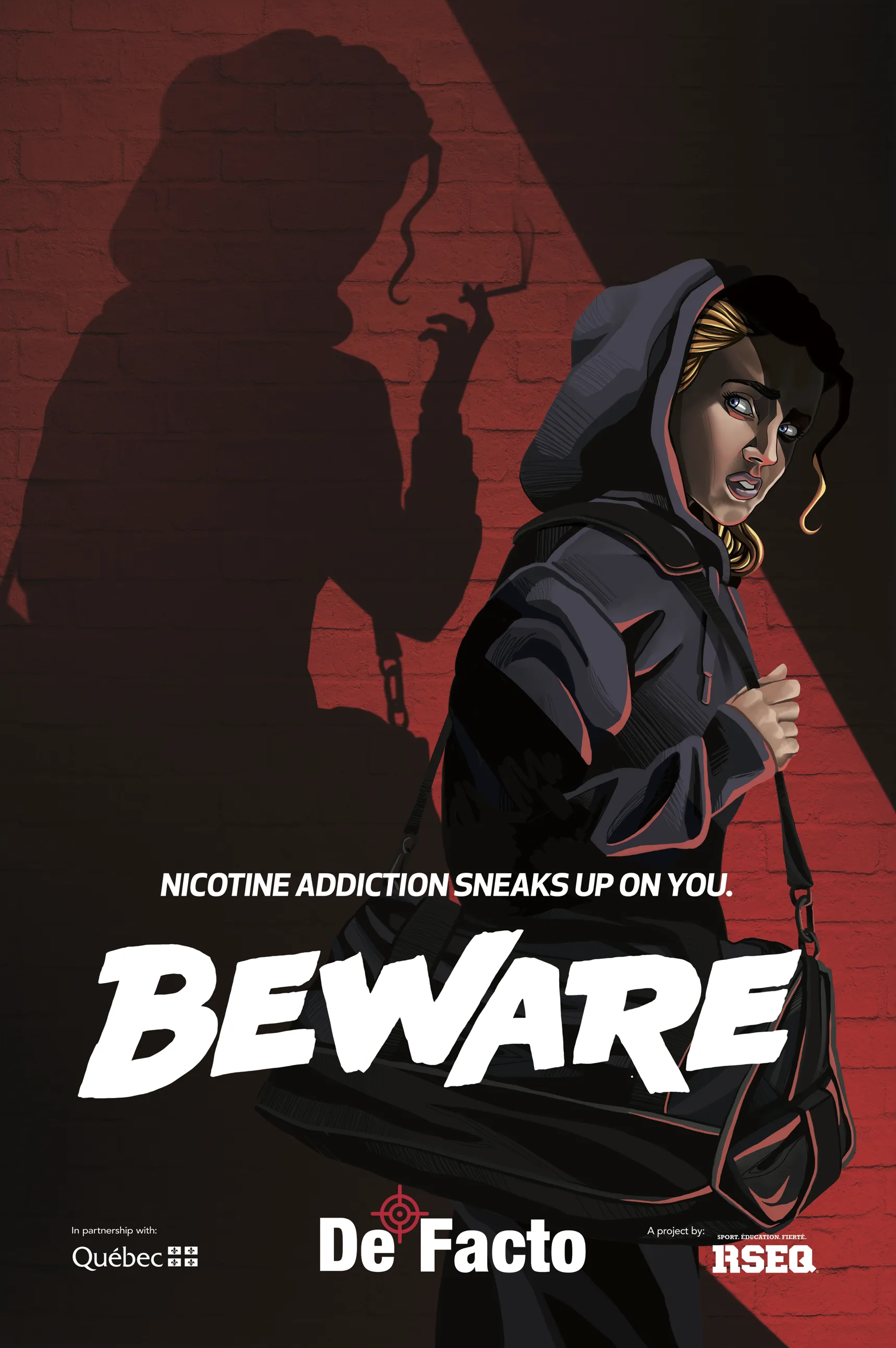
2023
THINK ABOUT IT BEFORE YOU LIGHT UP.
The campaign takes the form of an ASMR video designed to create an immersive and unsettling auditory experience. It aims to provoke thought and highlight the health risks of smoking.
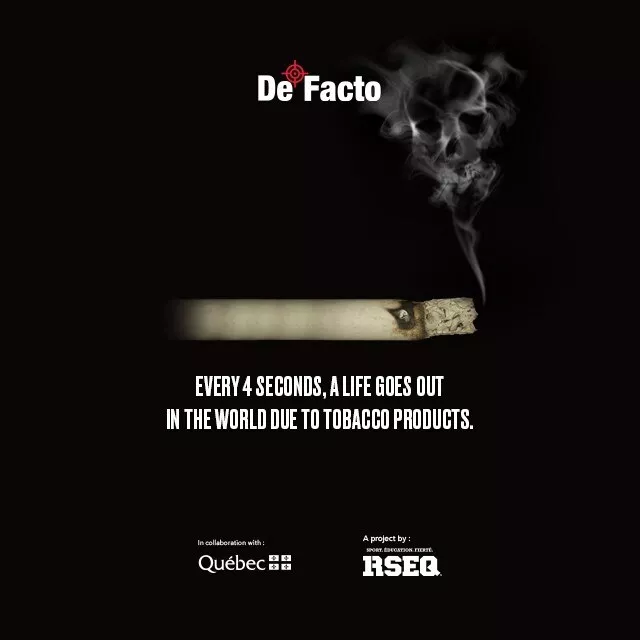
2022
WHEN THE CIGARETTE BURNS OUT, SO DOES THE SMOKER.
This edition, entitled "Devenir poussière" ("Becoming dust"), focuses on the subject of addiction, and aims to make young people aware of the repercussions of using tobacco products.
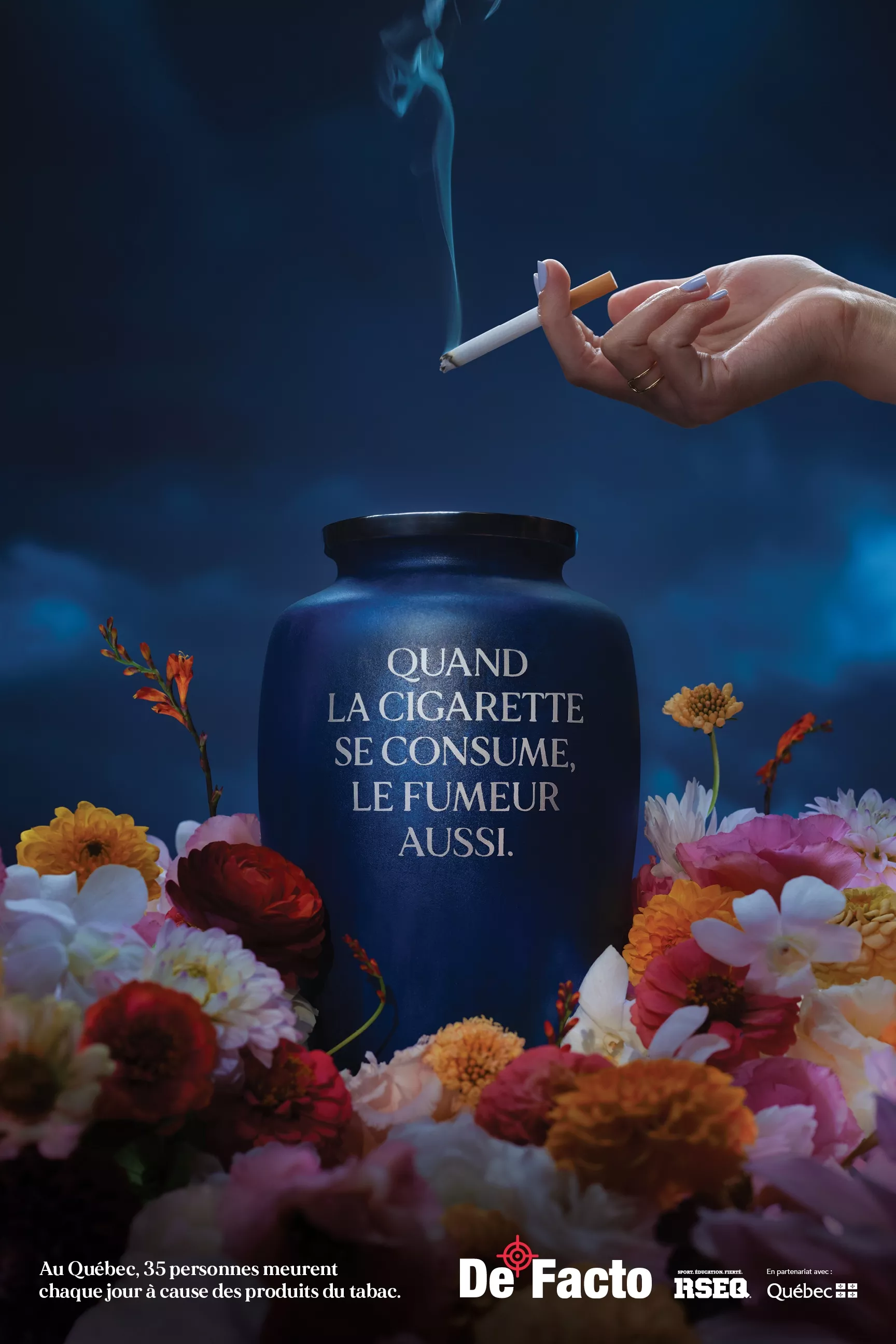
2021
PARTY'S OVER.
This campaign intends to make young people understand that, for far too long, the tobacco industry has been profiting from their addiction to tobacco products and it's time for this party to come to an end.
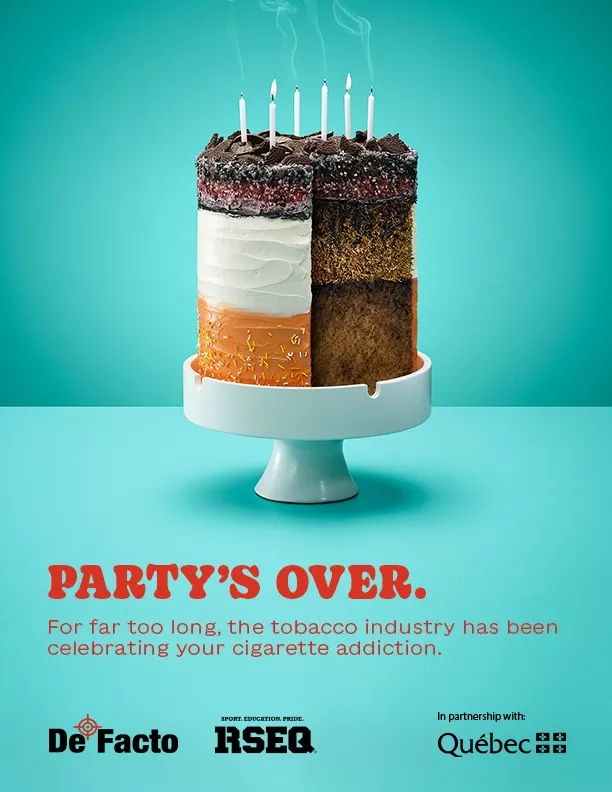
2020
YOUR ADDICTION HAS CONSEQUENCES.
The tobacco industry blames its customers for the use of its toxic, addictive, deadly and environmentally harmful products. Smokers can make a choice, but the influence of peers, friends and social media is so powerful that in reality, once they start smoking, quitting becomes a serious struggle.

2019
YOUR ADDICTION HAS CONSEQUENCES.
The tobacco industry has serious environmental consequences. In fact, each year, 4000 billion cigarette butts poison nature and 2 billion m² of forest are razed by the tobacco industry.
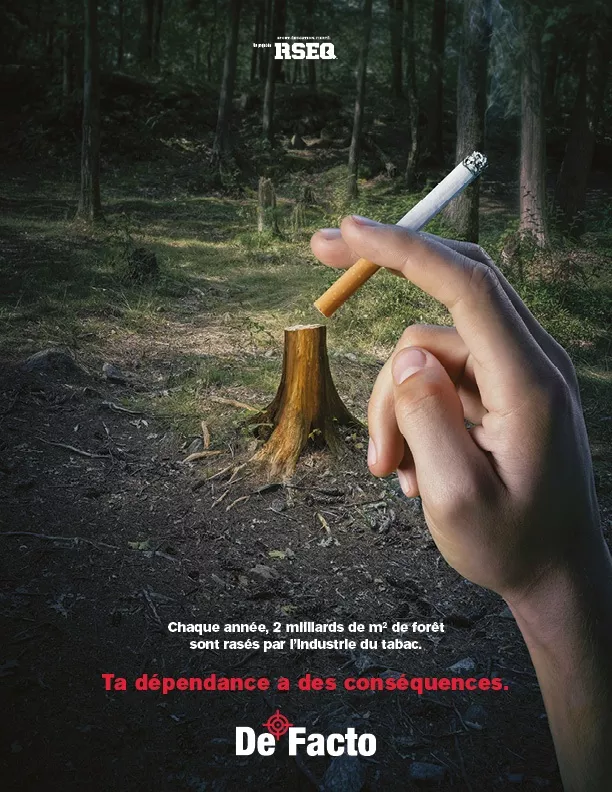
2018
END THIS TOXIC RELATIONSHIP.
The tobacco industry offers you a product containing more than 7000 chemicals for you to fall in love with cigarettes.
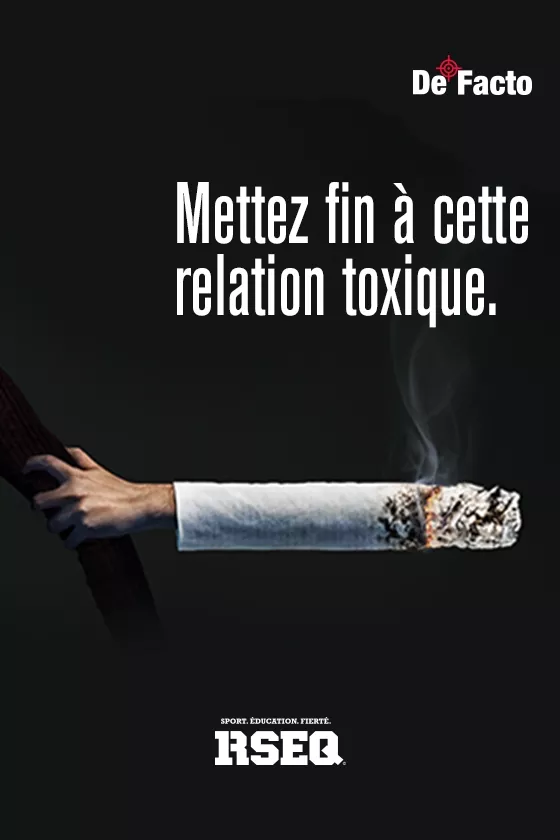
2017
BEING ADDICTED TO CIGARETTES IS LIKE BEING ADDICTED TO TAR
Tobacco products contain over 7,000 chemicals including many carcinogens. Nicotine is what is responsible for creating addiction.
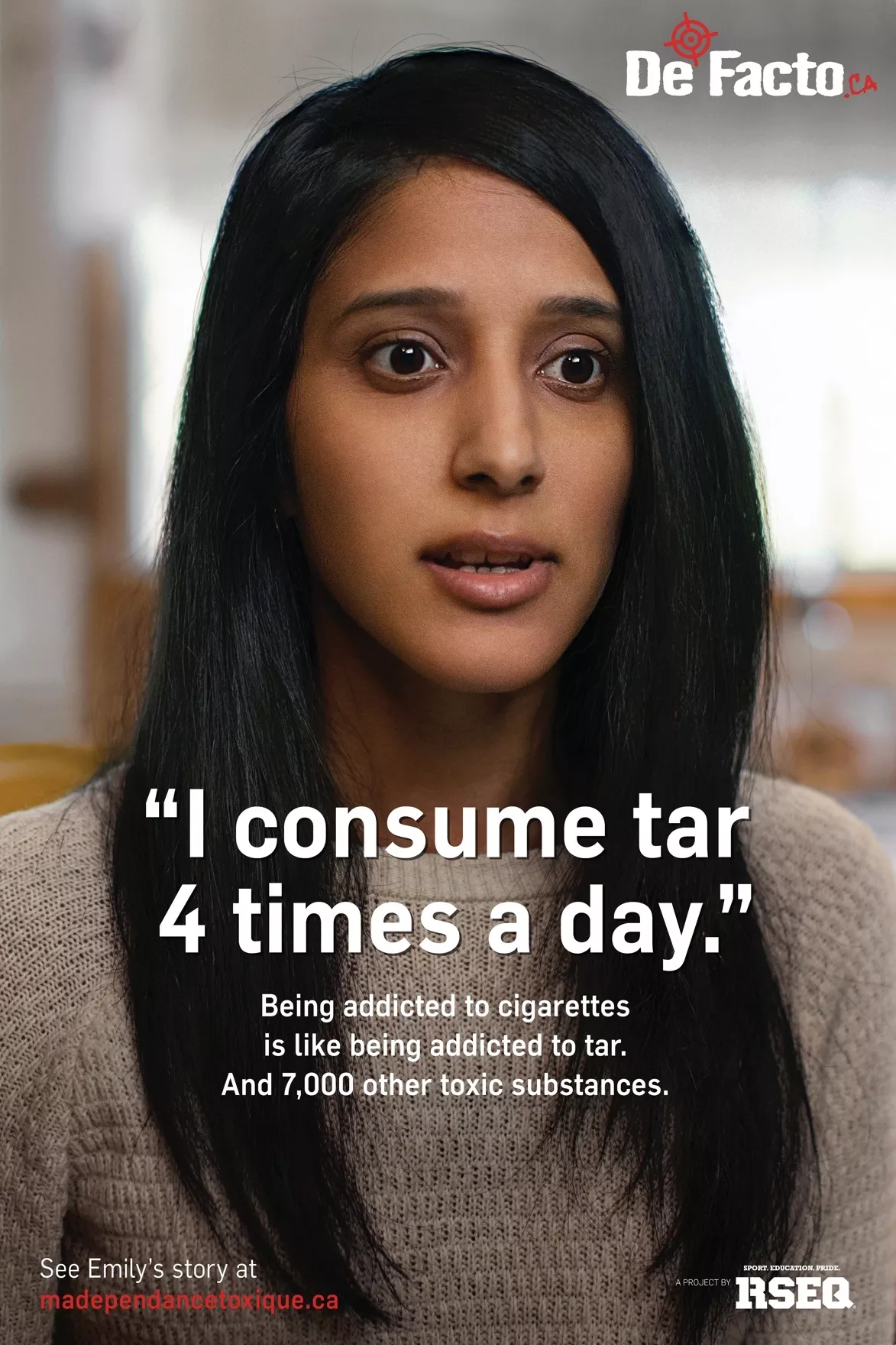
2016
NICOTINE ADDICTION HAS A HOLD ON YOU
The dependency caused by the toxic, addictive and deadly products produced by the tobacco industry limit the actual choice to smoke or not.
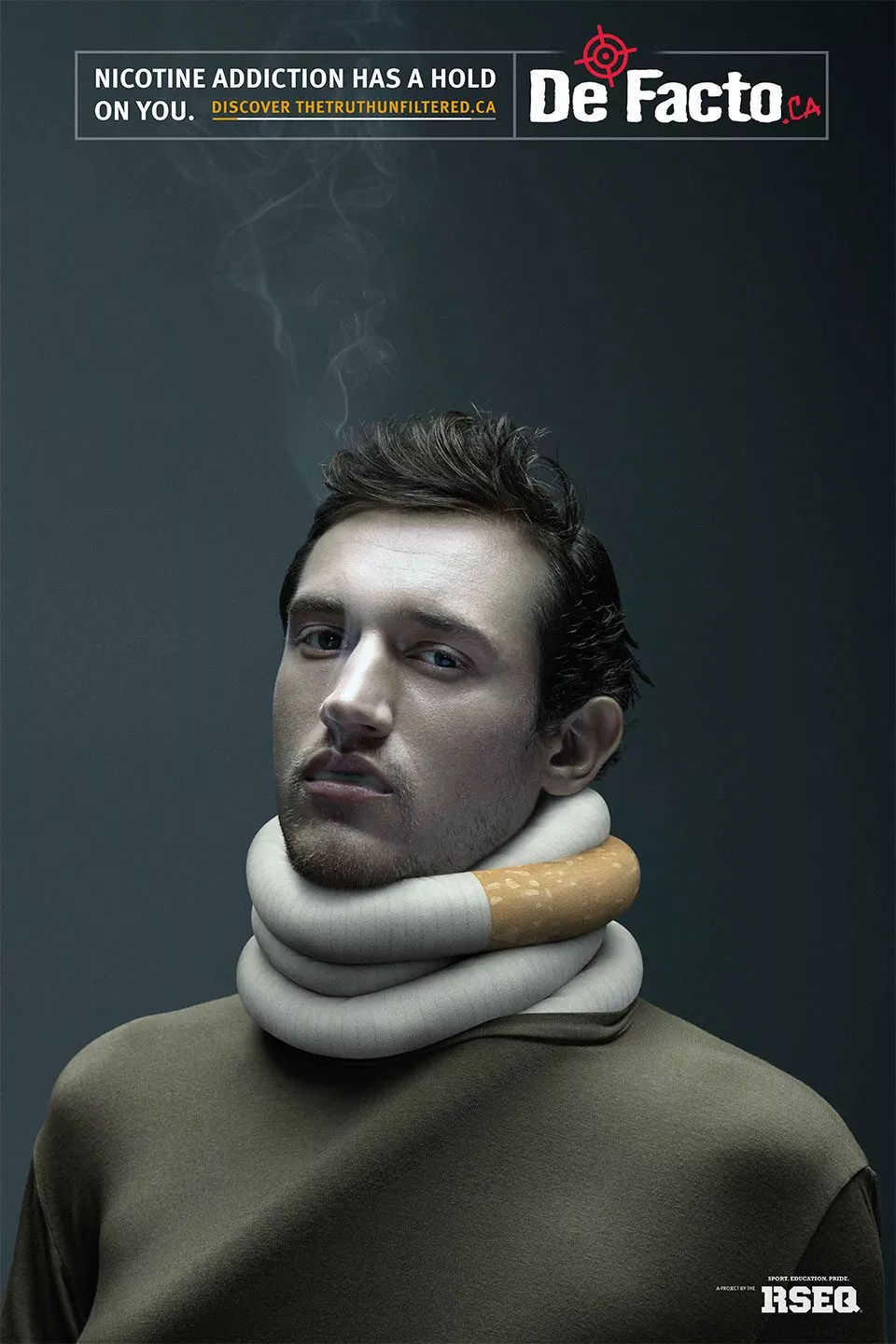
2015
THE TOBACCO INDUSTRY DOES NOT GIVE YOU A CHOICE
The majority of smokers do so due their dependency on nicotine and not by choice. Sadly, each day in Quebec tobacco kills the equivalent of a class of 28 people.
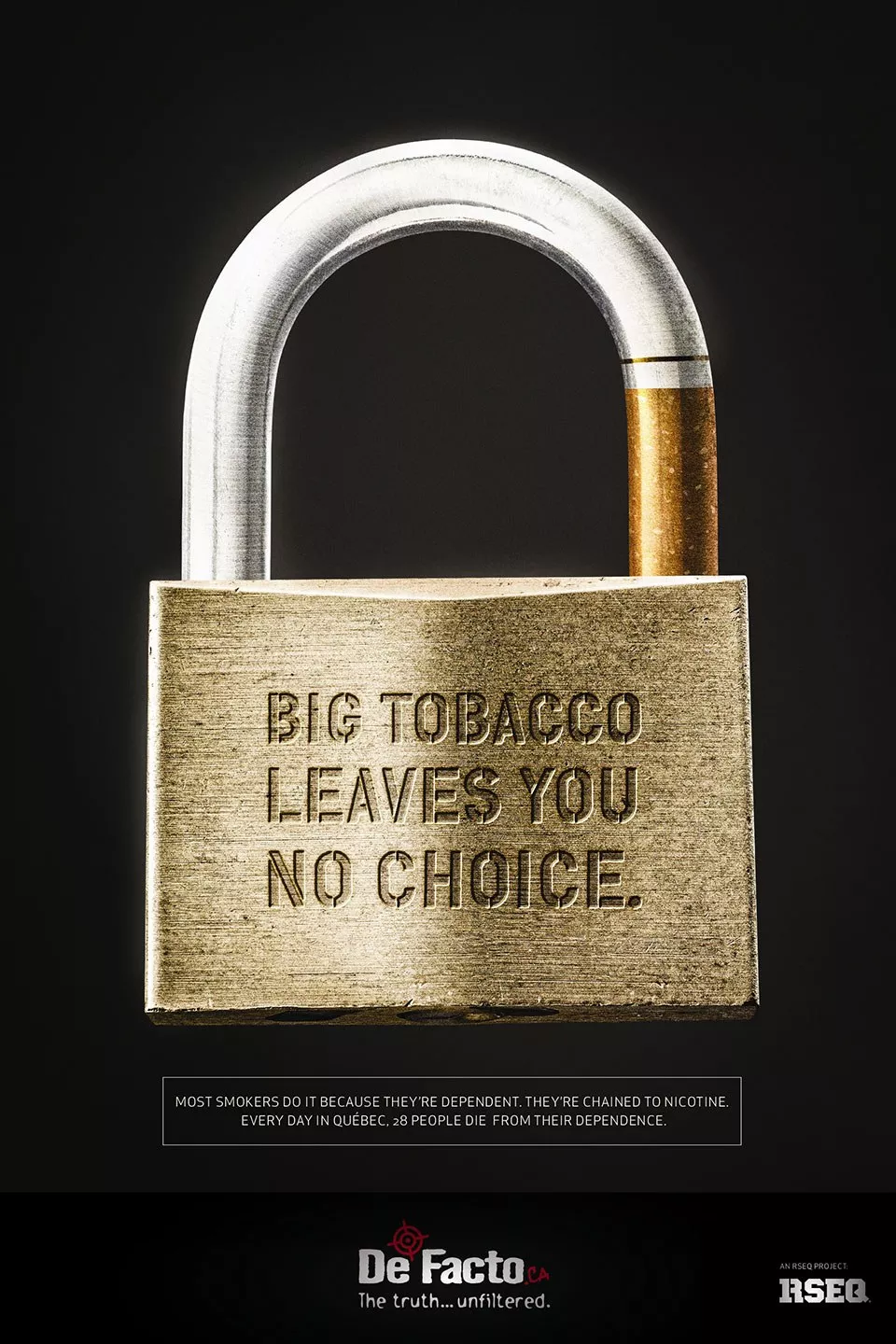
2014
THE PERFECT CUSTOMER
Mister Tobacco (Real Bossé) once again denounces the marketing strategies employed by the tobacco industry which manages to recruit 90 new young people of the average age of 13 each day. These help replace those who die from tobacco. Business is business!
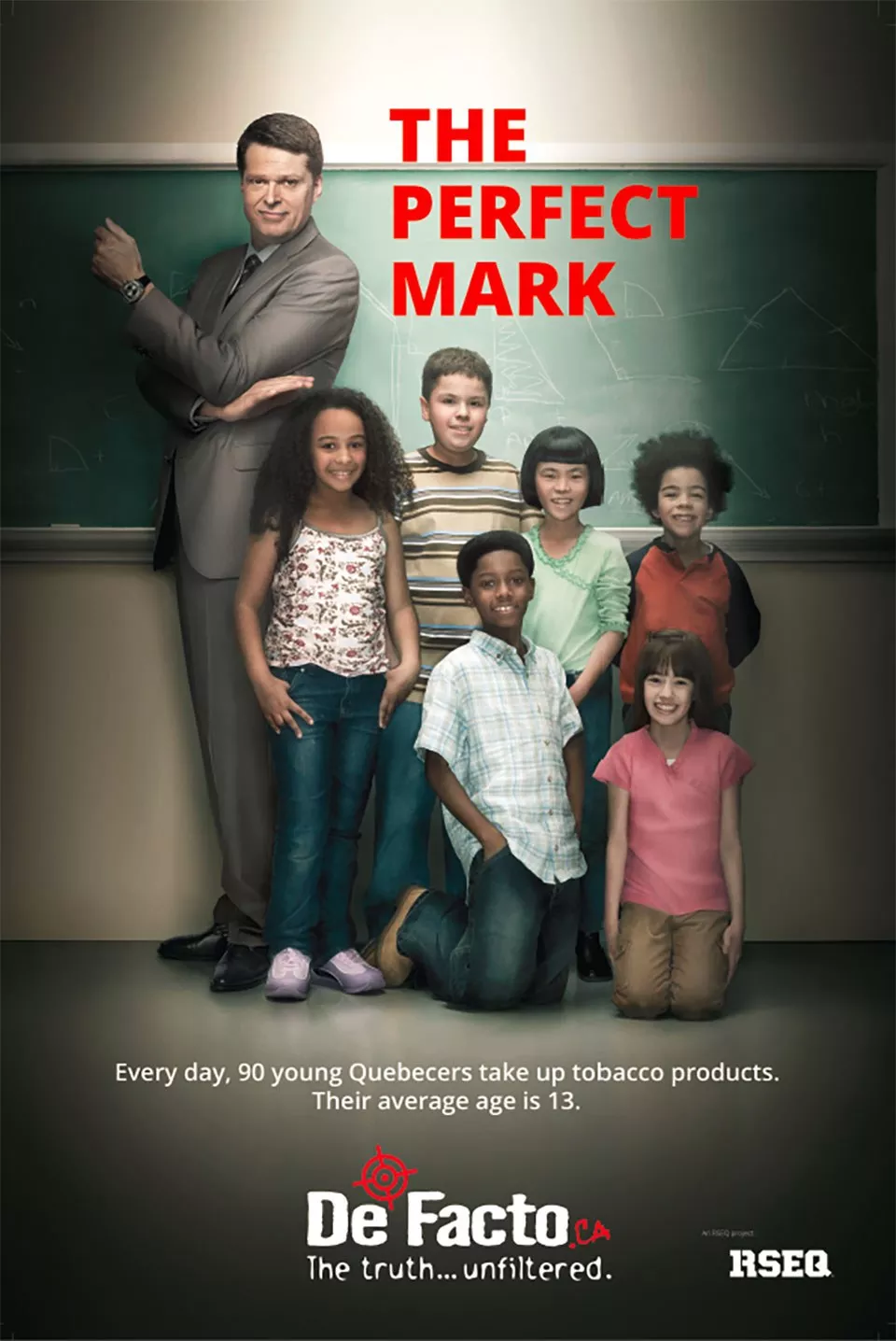
2013
MARKETING STRATEGIES TO REPLACE DYING CUSTOMERS
Réal Bossé becomes the spokesperson for de facto for three years. He interacts with mister tobacco on the tactics used by the tobacco industry to draw in young people via three ads. He slams the addition of flavours in tobacco to attract young people and the creation of new products and impressive packaging instead of a generic look for these deadly products.
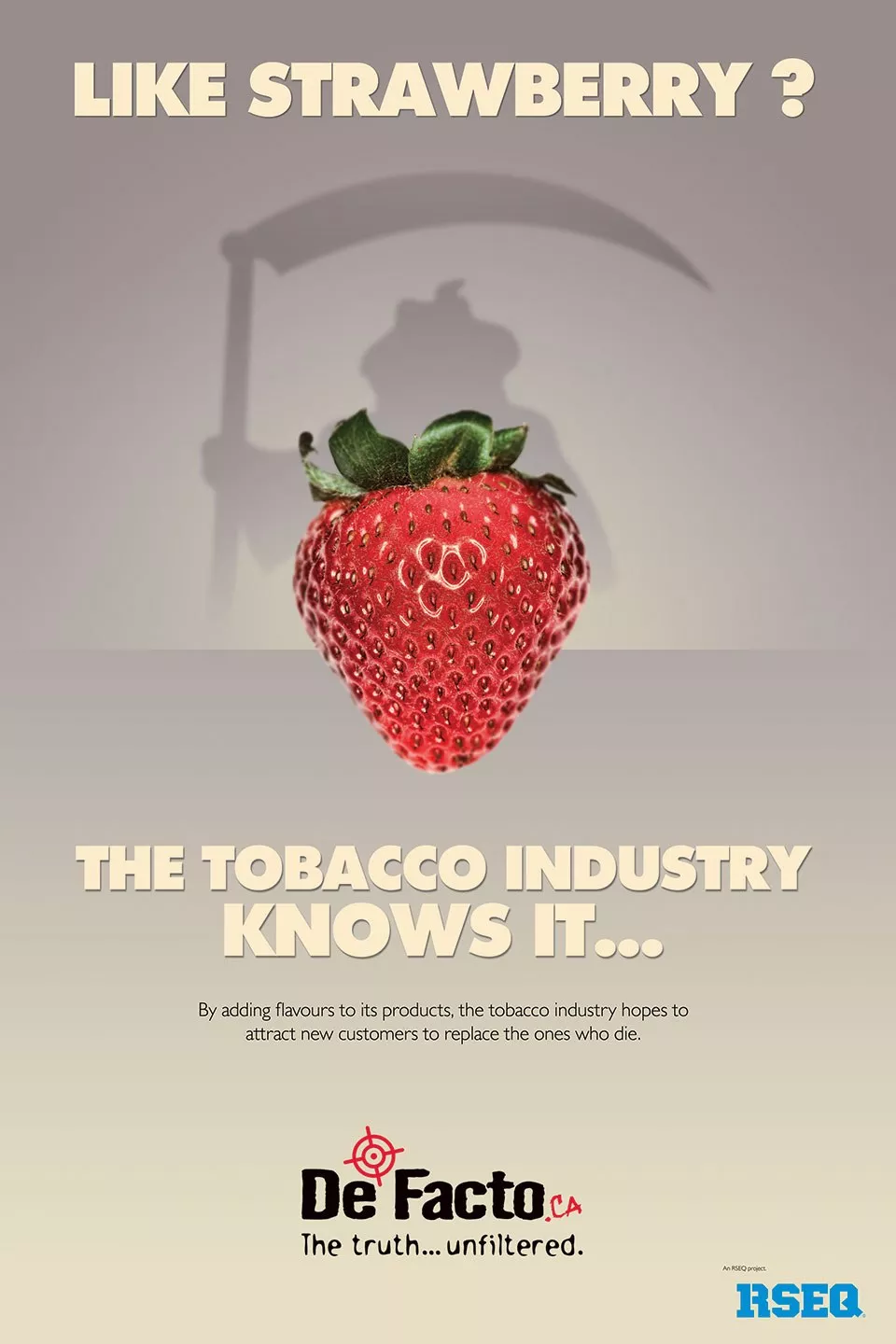
2012
AN INNOVATIVE INTERACTIVE CAMPAIGN “SIX MILLION DEAD”
2011
MAKING PROFITS BY SELLING PRODUCTS THAT KILL: “LIFE ROBBERS”
2010
WELL PACKAGED, JUST AS DEADLY
The tobacco industry sells its products in attractive packaging to impact youngsters. These products lead to the deaths of over five million people worldwide.
2009
A THIRD MEDIA CAMPAIGN FOR DE FACTO
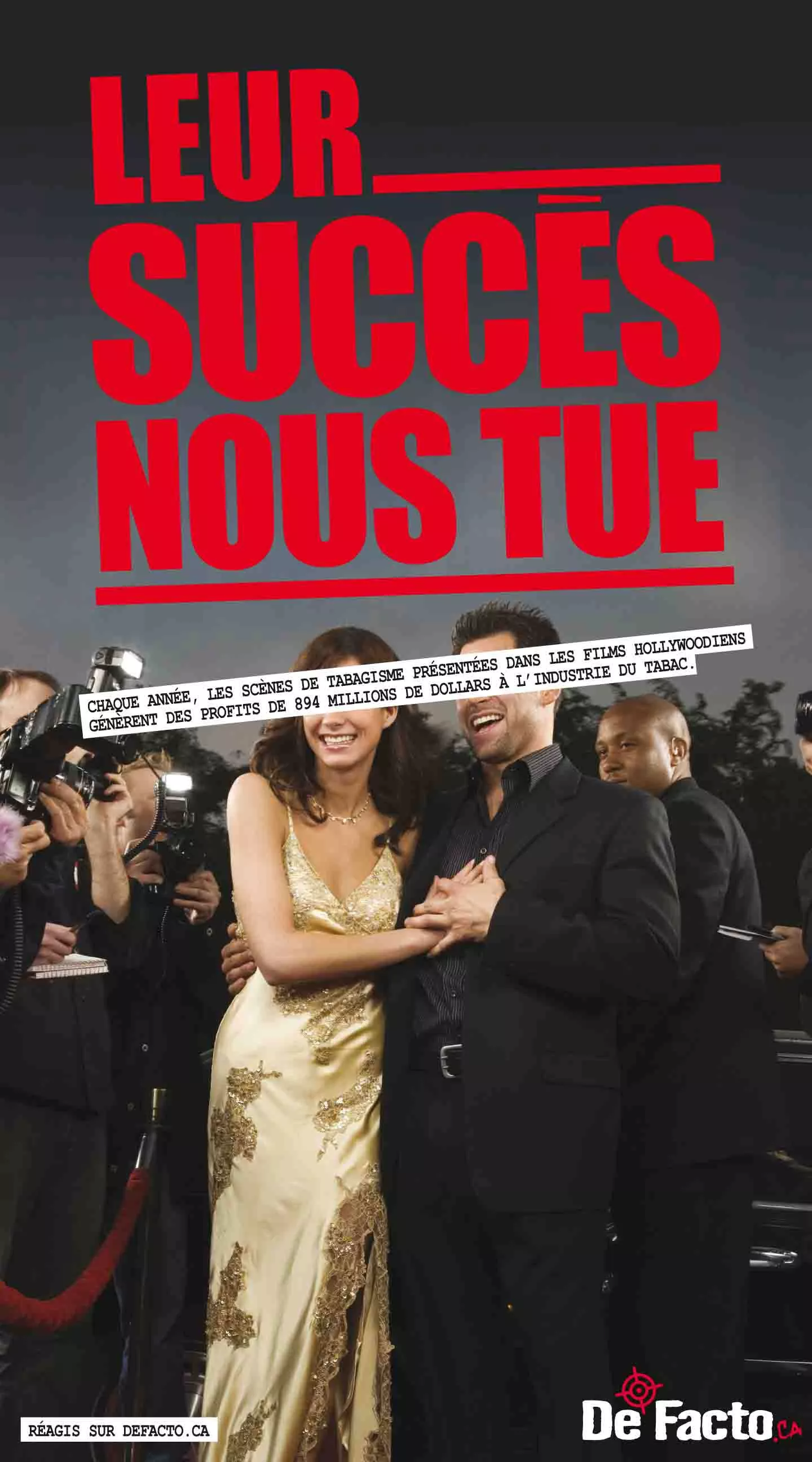
2007
DE FACTO DEPLOYED ACROSS QUEBEC
Student athletes from universities become De Facto ambassadors. All Quebec CEGEPS and universities take part in the De Facto project. The project is then promoted in high schools in the Eastern Township area and is now under the guidance of the RSEQ.
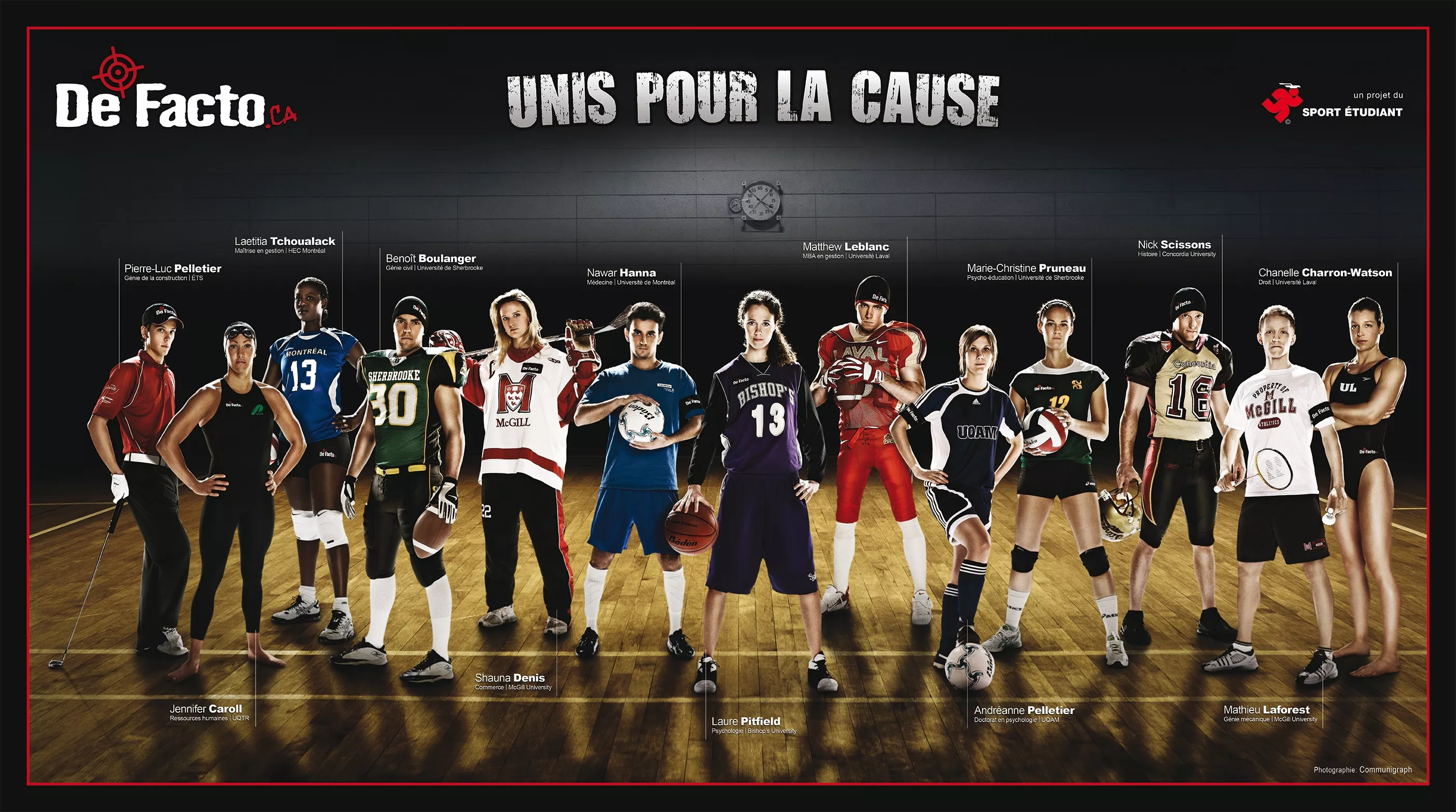
2005
DE FACTO BEGINS TO GROW
Building off the success in the Quebec City and Chaudière-Appalaches region, the De Facto Project expands and now reaches the Saguenay region.
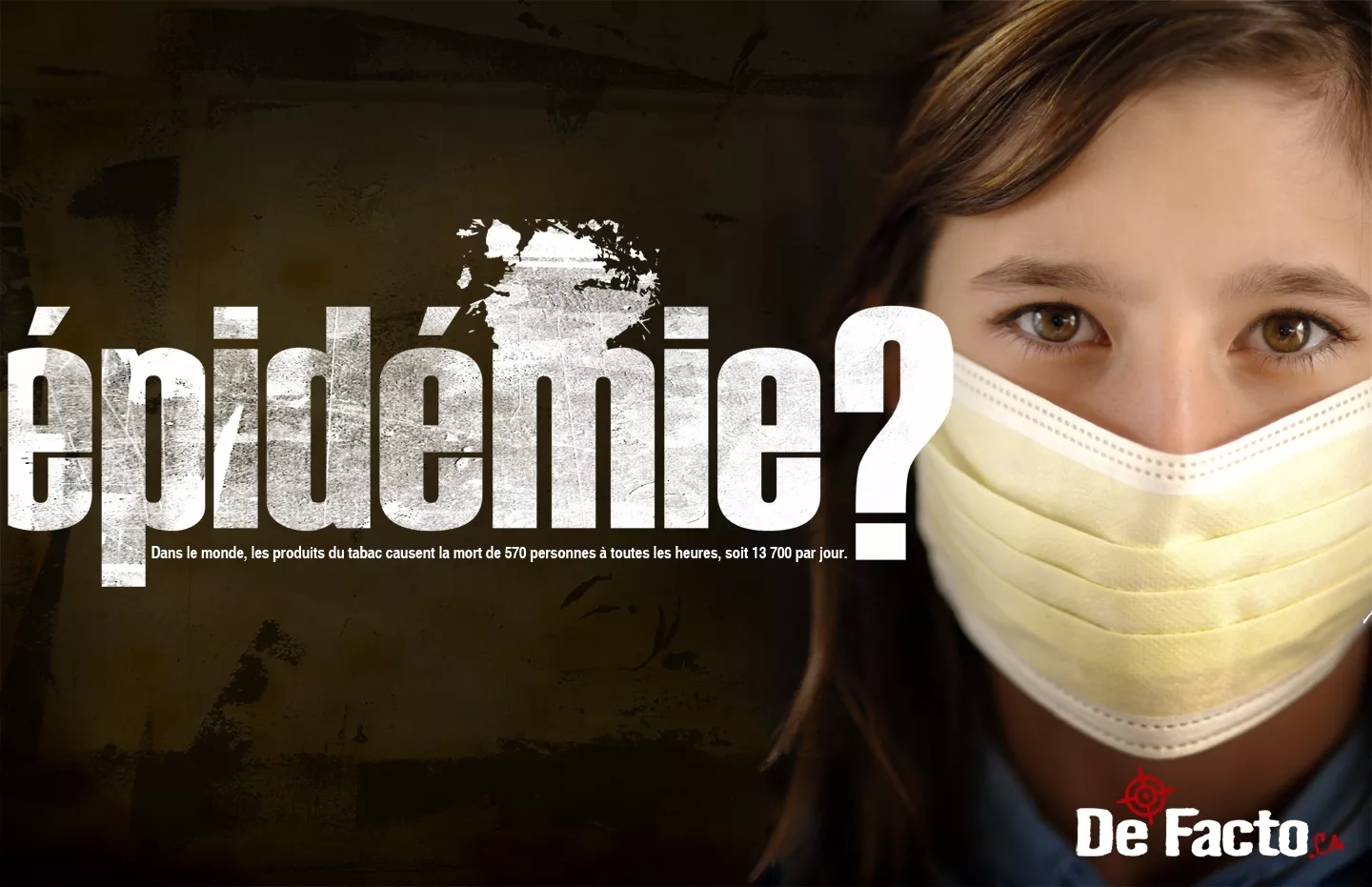
2003
WELL PACKAGED, JUST AS DEADLY
A first major media campaign, financed by Health Canada, to launch the project of de-normalizing the tobacco industry known as De Facto. The tobacco industry was immediately intimidated and for the first time in Canada, the three companies react to a fight against tobacco, reinforcing the RSEQ’s conviction that their messaging and action via De Facto are making an impact.
2002
HONOURABLE MENTION
On National Anti-Tobacco day, the RSEQ of Quebec City and Chaudière-Appalaches receive an honourable mention from the World Health Organization for the De Facto project – a filterless look at the truth linking sport and tobacco control.
2001
THE TRUTH WITHOUT FILTER IS BORN
The creation of the pilot project “True, the truth without a filter” by the Regional association of student athletes of Quebec City and Chaudière-Appalaches (later to become the RSEQ of Quebec City and Chaudière-Appalaches). Dissemination of messaging and promotional tools in the fight against tobacco in schools from the Quebec City and Chaudière-Appalaches regions and at bigger events.

